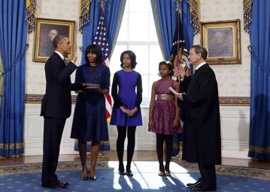
January 22, 2013

Rarely have second terms lived up to the hopes and expectations of presidents or their electorates.
FDR’s began with an attempt to pack the Supreme Court by adding new justices and a second Depression of 1937. He was rescued only by the war in Europe in 1939 and the GOP’s nomination of “the barefoot boy from Wall Street,” Wendell Willkie.
What can be called Harry Truman’s second term was a disaster.
In 1949, the Soviets exploded an atom bomb and China fell to Mao. In 1950, the Rosenbergs were convicted as atomic spies for Stalin and North Korea invaded the South, igniting a three-year war Truman could not win or end.
He lost the New Hampshire primary in 1952 to Sen. Estes Kefauver, dropped out and saw would-be successor Adlai Stevenson crushed by Gen. Dwight Eisenhower, as Republicans captured Congress. Truman left with the lowest approval rating of a president before or since.
In his second term, Ike did better, but suffered a GOP defeat in 1958, saw Fidel Castro seize Cuba in January of 1959, and had the U-2 shot down by Russia in May 1960 and his Paris summit blown up by Nikita Khrushchev, who berated Ike to his face. His vice president, Richard Nixon, then lost the White House.
The Kennedy-Johnson second term began spectacularly, with passage of all the Great Society legislation. But, in 1966, LBJ’s party suffered huge losses. In 1968, that year of assassinations of Martin Luther King Jr. and Robert Kennedy, of race riots in a hundred cities, and of campus anarchy, antiwar protests and an endless war in Vietnam, LBJ was challenged in the primaries, quit the race, and saw Nixon succeed him.
After his own 49-state re-election victory, Nixon did not survive his second term. Jimmy Carter did not get a second term.
Ronald Reagan comes close to being the exception.
While he lost 10 Senate seats in 1986, he cut income tax rates from 50 to 28 percent, and his summiteering with Mikhail Gorbachev is seen as a historic success, leading to America’s victory in the Cold War.
The Iran-Contra scandal—trading of arms to Iran for hostages in Lebanon—almost broke his presidency. But by the time Reagan left in 1989, his popularity had been restored, the Cold War was ending, and his vice president was taking the oath of office to succeed him.
George H.W. Bush was denied a second term. And the main event of Bill Clinton’s was his impeachment and Senate trial for the Monica Lewinsky affair.
In his second term, George W. Bush lost his battle for Social Security reform and lost both houses of Congress in 2006, ending his presidency with America mired in two unwinnable wars and plunging into a near-depression.